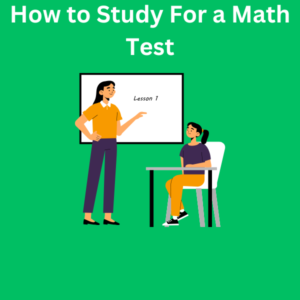Studying for a math test can feel overwhelming, but with a bit of strategy and preparation, you can walk in feeling confident and ready to tackle even the hardest problems. Math is a subject that builds on itself, so every test is an opportunity to strengthen your understanding of key concepts. Whether you’re dealing with basic math, algebra, calculus, or any other area of mathematics, this guide will show you how to approach your study routine for maximum success.

Steps to Effectively Study for a Math Test
- Review Your Class Notes and Homework Assignments: Review your class notes and homework problems. Going through your notes helps you refresh the important concepts your teacher emphasized. Don’t skip the homework assignments you struggled with — these are likely areas that need more practice. Also, ensure you understand the steps your teacher used to solve examples in class.
- Identify Key Concepts and Formulas Math exams often test your grasp of specific key concepts and formulas. Write down a summary of these in a study guide. Memorizing formulas is essential, but make sure you also understand how they work so you can apply them to different types of math problems.
- Work Through Example Problems and Practice Tests Practice is the key to doing well in math. Look through your textbook and class materials, for example, problems similar to those you’ll encounter on the test. Create or take a practice test to simulate test conditions, working within a time limit. Practicing under timed conditions helps you pace yourself and reduce stress on test day.
- Understand Your Mistakes and Learn from Them Reviewing incorrect answers is one of the best ways to prepare. Look over past homework, quizzes, or practice tests and focus on the reasons students lose points, like skipping steps or making simple calculation errors. Understanding your mistakes will help you avoid them on the test.
- Practice with a Study Group or Tutor Studying alone is effective, but a study group can provide different perspectives on tough problems. If there are specific areas where you still struggle, consider meeting with a tutor for extra help. Sometimes, explaining concepts to others can deepen your understanding as well.
- Use Additional Resources and Practice Problems If you want to cover more ground, look at other sites that offer practice problems and explanations, such as Khan Academy or educational math apps. These resources often break down complex concepts with additional examples that can clarify things further.
- Focus on Math Vocabulary Many students overlook the importance of math vocabulary, but terms and definitions can be as important as solving the equations themselves. Review the math vocabulary related to your test; for example, knowing terms like “integer,” “factor,” or “rational number” can help you better understand questions and avoid mistakes.
- Get a Good Night’s Sleep Before the Test Staying up late to study might feel like the right choice, but getting enough sleep is vital. A well-rested mind is more focused and able to recall information better. Ensure you get a good night’s sleep so you feel ready to tackle the test in the morning.
Frequently Asked Questions (FAQs)
Q: What is the best way to memorize formulas for a math test?
A: Start by writing down the most important formulas on a sheet you can refer to regularly. Practice using them in different contexts to make sure you really understand them.
Q: How early should I start studying for a math exam?
A: Ideally, start at least a week in advance so you have time to review, practice, and ask questions about anything you don’t understand.
Q: Should I rely on my calculator during a math test?
A: Only use your calculator if the test allows it, and make sure you know how to solve problems manually. Relying too much on a calculator can slow you down if you make input errors.
Q: What should I do if I forget a concept during the test?
A: If you blank out, try to recall a similar problem from your homework or an example problem. Sometimes working through steps you remember can help jog your memory.
Q: Is it better to answer every question on the test, even if I’m not sure of the answer?
A: Yes, give every problem a try. Many math teachers give partial credit for attempting problems, so showing your work can boost your score.
